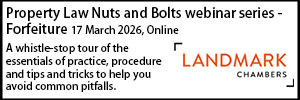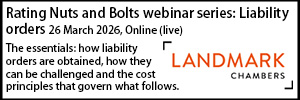POCA and improper planning prosecutions
- Details
 The Court of Appeal recently upheld the stopping of prosecutions against 11 defendants for breaches of a planning enforcement notice. Scott Stemp explains why.
The Court of Appeal recently upheld the stopping of prosecutions against 11 defendants for breaches of a planning enforcement notice. Scott Stemp explains why.
The Court of Appeal upheld the stopping of the prosecutions::
- because the prosecutions were improperly motivated by the council’s desire to pursue POCA;
- because of representations made by councillors; and
- because the council had failed to properly consider the public interest before prosecuting
The Court of Appeal in Wokingham Borough Council. v. Scott and others [2019] EWCA Crim 205 refused an appeal by Wokingham Borough Council against the decision of HHJ Morris staying the council’s prosecution of Mr Scott and ten other defendants for alleged breaches of a planning enforcement notice.
The prosecutions were stayed as an abuse of process as the Court held that the council (through its councillors, with the knowledge of officers of the planning department) had induced Mr Scott to abandon his planning appeal, that the prosecution was at least in part motivated by POCA and the desire by the council to pursue confiscation, and because the council had failed to properly consider the public interest in pursuing prosecutions.
The matter revolved around Hare Hatch Sheeplands, a small garden centre owned by Mr Scott, which included a horticultural nursery and farm shop. Without planning consent, the site grew and developed over many years. Wokingham Borough Council served an enforcement notice in relation to that expansion and, having been served with that enforcement notice, Mr Scott lodged an appeal against it.
Councillors, with the knowledge of officers from the planning department, encouraged Mr Scott to abandon his planning appeal, suggesting to him that a certificate of lawfulness would be granted should he do so. It subsequently became clear that a certificate could never have been granted as a matter of law. The council then commenced civil and later criminal proceedings against Mr Scott and occupiers of the site.
In upholding the stay as an abuse of process, the Court of Appeal emphasised that POCA was an improper consideration for a local authority to have regard to in determining whether to prosecute and that the possibility of a confiscation order being made in the prosecutor's favour should play no part in the determination of the evidential and public interest test within the Code for Crown Prosecutors.
The Court found that the actions of councillors in inducing Mr Scott to abandon his planning appeal (with the knowledge of officers from the planning department) was behaviour which brought about a situation where the council held all the cards. Having brought that situation about, the council then sought to take advantage of the situation by prosecuting Mr Scott and others. That whole course of conduct so affronted the court’s sense of justice that the prosecutions ought to be stayed. There was no need for an unequivocal undertaking from the council not to prosecute before proceedings could be stayed.
Central to the application to stay proceedings was disclosure of emails from councillors’ personal email accounts, which had been used to communicate with other councillors and officers of the planning department about the situation at Hare Hatch Sheeplands using email addresses which were not council emails. The disclosed personal emails of councillors corroborated the evidence of Mr Scott regarding the inducements made to him.
The Court of Appeal also found that when authorising the prosecutions the council had not appeared to properly apply the public interest test of the Code for Crown Prosecutors. The Court emphasised that local authorities must be satisfied there is sufficient evidence to provide a realistic prospect of a conviction of each suspect on each charge and that in every case there is a public interest in proceedings.
Comment
This is an important decision not only for the 11 defendants now acquitted but for all local authorities who prosecute planning matters. In determining to prosecute, local authorities must be transparent and scrupulously fair, ensuring that they apply their minds to each charge against each defendant separately and excluding from the process of authorising prosecution any consideration of orders under POCA. Authorities also need to be aware of the effects of statements made by their members and officers in the minds of potential defendants and must be alive to the need to conduct discussions with good sense on each side and in good faith. Failure to pay heed to these may result in prosecutions being stayed as an abuse of process.
Scott Stemp is a barrister at No 5 Chambers. He represented nine of the eleven successful defendants.
Sponsored articles
Walker Morris supports Tower Hamlets Council in first known Remediation Contribution Order application issued by local authority
Unlocking legal talent
Legal Director - Government and Public Sector
Senior Solicitor - Property
Legal Officer
Locums
Locums
Poll














































